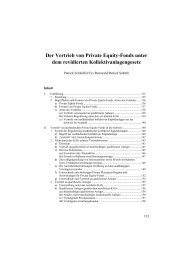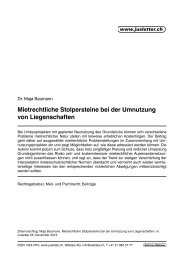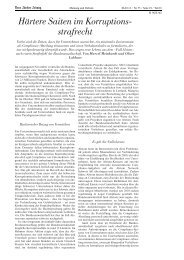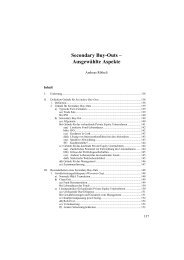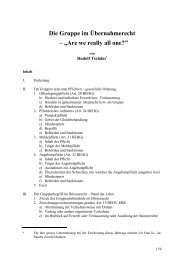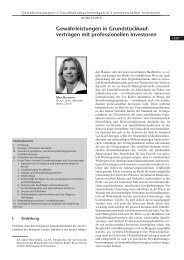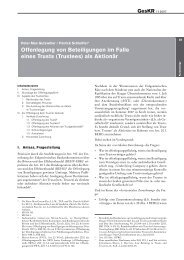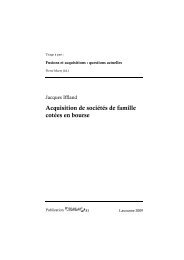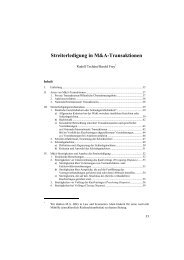Cross-border financial serv - Lenz & Staehelin
Cross-border financial serv - Lenz & Staehelin
Cross-border financial serv - Lenz & Staehelin
You also want an ePaper? Increase the reach of your titles
YUMPU automatically turns print PDFs into web optimized ePapers that Google loves.
Shelby R. du Pasquier / Philipp Fischer – <strong>Cross</strong>-<strong>border</strong> <strong>financial</strong> <strong>serv</strong>ices in and from Switzerland GesKR 4 2010<br />
private banking» market, with a 27 % market share in<br />
2007 3 .<br />
This contribution is divided into two parts. The first part<br />
is dedicated to an analysis of the Swiss rules governing<br />
cross-<strong>border</strong> <strong>financial</strong> activities targeted at the Swiss<br />
market (inbound perspective) (see Section II. below). In<br />
the second part, we will examine some of the restrictions<br />
that Swiss <strong>financial</strong> institutions face when providing<br />
their <strong>serv</strong>ices outside of Switzerland, in particular in the<br />
EU (outbound perspective) (see Section III. below).<br />
As an initial caveat to the reader, it ought to be pointed<br />
out that the focus of this contribution is the provision<br />
of <strong>financial</strong> <strong>serv</strong>ices in or from Switzerland. This contribution<br />
will not address specifically the authorization<br />
requirements that apply to the <strong>financial</strong> products which<br />
may be distributed in or from Switzerland.<br />
II. Activities conducted in Switzerland<br />
(inbound perspective)<br />
This first section analyzes the offering and performance<br />
of <strong>financial</strong> <strong>serv</strong>ices on Swiss soil by <strong>financial</strong> institutions<br />
incorporated outside of Switzerland. We shall<br />
distinguish between the businesses of banking (1.), securities<br />
dealing (2.), offering consumer credits (3.), accepting<br />
a Swiss member to a foreign securities exchange<br />
(4.) and asset management (5.). We shall also address the<br />
activities related to the distribution and management of<br />
collective investment schemes (6.) and the distribution<br />
of so-called «insurance wrappers» (7.). As will be shown<br />
hereunder, Switzerland places a strong emphasis on the<br />
principle of home country control and has, as a result,<br />
taken a relatively liberal stance with respect to the regulation<br />
of cross-<strong>border</strong> <strong>financial</strong> <strong>serv</strong>ices.<br />
1. Banking <strong>serv</strong>ices<br />
From a Swiss perspective, the regulation of cross-<strong>border</strong><br />
banking activities on the domestic market hinges<br />
upon a «physical presence» test, which will be discussed<br />
in more detail hereinafter. Regulation focuses on the<br />
structure, if any, used by the non-Swiss market participant,<br />
rather than on the <strong>serv</strong>ices actually offered or rendered<br />
to Swiss-based customers 4 .<br />
3 Urs Zulauf, (Zunehmende) Rechtsrisiken im grenzüberschreitenden<br />
Finanzgeschäft, FINMA press conference of October 22,<br />
2010, 1 (German version available online at: http://www.finma.<br />
ch/d/medien/medienanlaesse/Documents/pdp-genf-referat-urszulauf-20101022-d.pdf).<br />
4 David Wyss/Urs Zulauf, Fiktiver Sitz oder faktische Zweigniederlassung<br />
– Der Räumliche Geltungsbereich schweizerischer<br />
Finanzmarktaufsichtsgesetze und ihre Durchsetzung durch die<br />
Eidg. Bankenkommission gegenüber ausländischen Banken und<br />
Effektenhändler, in: Spühler (Ed.), Internationales Zivilprozess-<br />
und Verfahrensrecht, Zurich 2001, 117, 125.<br />
1.1 Definition of the regulated activities<br />
Banking business is defined as the acceptance or solicitation<br />
of deposits from the public, on a professional<br />
basis and with a view to finance, for own account, an<br />
unlimited number of unrelated individuals or business<br />
enterprises (interest-differential business 5 , Article 2a (a)<br />
BO 6 / 7 ). The activity is deemed conducted «on a professional<br />
basis» if it involves the acceptance of more than 20<br />
deposits on an ongoing basis from the public (Article 3a<br />
(2) BO) 8 .<br />
The BA regulates the conduct of a banking activity in or<br />
from Switzerland. The required license by the FINMA<br />
(Article 3 (1) BA) calls for compliance with a series of<br />
prudential requirements, including the following:<br />
• The bank must have a minimum capital, fully paid<br />
up, of at least CHF 10 million (Article 4 (1) BO). Depending<br />
upon the nature of its activities, capital adequacy<br />
requirements may necessitate a significantly<br />
higher equity basis 9 .<br />
• The bank must comply with certain organizational<br />
rules corresponding to the scope and nature of the<br />
planned activity (Articles 7 et seq. BO).<br />
• The individuals in charge of the management of the<br />
bank must have appropriate professional qualifications<br />
necessary to the exercise of their activities and<br />
present all guarantees of an irreproachable business<br />
conduct (fit and proper test, Article 3 (2) (c) BA).<br />
This requirement also applies to shareholders whose<br />
stake in the bank exceeds 10 % (Article 3 (2) c bis BA).<br />
We shall examine in further detail below the regulator’s<br />
use made of this last requirement in order to monitor<br />
5 BSK BankG-Bahar/Stupp, Art. 1 NN 2 and 4.<br />
6 It is worth noting that, pursuant to Article 2a (b) BO, the definition<br />
of the business of banking also covers entities that «are<br />
engaged in substantial financing activities in favour of unrelated<br />
individuals or business entities if such activities are funded by<br />
several unrelated banks». Pursuant to the practice of the Swiss<br />
regulator, this provision applies if the refinancing activities of the<br />
relevant entity exceed CHF 500 million during four consecutive<br />
quarters and if the relevant funds are provided by more than five<br />
banks (SFBC Annual Report 1989, 14).<br />
7 As an aside, currency traders for the account of clients (forex<br />
traders) are regulated in Switzerland as banks since April 1, 2008.<br />
8 Conversely, any business entity which is not regulated under the<br />
BA is not permitted to accept deposits from the public on a professional<br />
basis (Article 1 (2) BA) and is not allowed to engage into<br />
any type of promotional activities for such <strong>serv</strong>ices (Article 3 (1)<br />
BO). There is however an exception for corporate bodies, or entities<br />
established under public law, and whose liabilities benefit<br />
from a public guaranty (Article 3a (1) BO).<br />
9 Swiss capital adequacy rules are currently in the process of being<br />
updated to conform to the Basel III requirements. See FINMA,<br />
Report on an amendment to the Capital Adequacy Ordinance,<br />
July 14, 2010 (German version available online at: http://www.<br />
finma.ch/d/regulierung/anhoerungen/Documents/eb-eigenmittel-risikoverteilung-20100714-d.pdf)<br />
and the report of the<br />
expert group on the «Too Big Too Fail» issue dated October 4,<br />
2010 (available online at: http://www.sif.admin.ch/dokumentation/00514/00519/00592/index.html?lang=en).<br />
437<br />
Aufsätze



